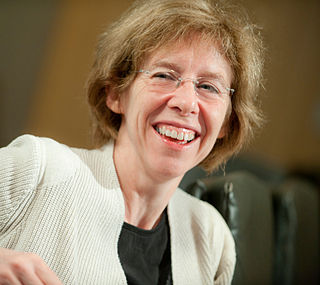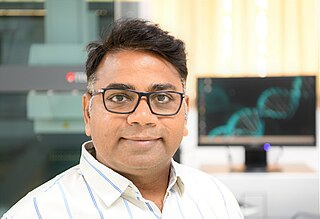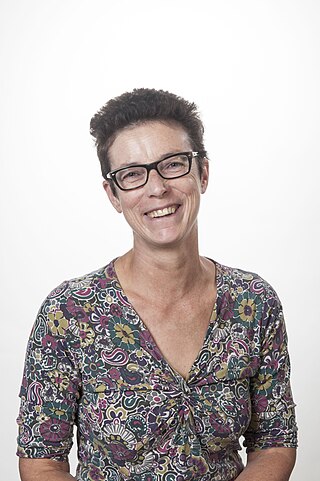Related Research Articles

The John Innes Centre (JIC), located in Norwich, Norfolk, England, is an independent centre for research and training in plant and microbial science founded in 1910. It is a registered charity grant-aided by the Biotechnology and Biological Sciences Research Council (BBSRC), the European Research Council (ERC) and the Bill and Melinda Gates Foundation and is a member of the Norwich Research Park. In 2017, the John Innes Centre was awarded a gold Athena SWAN Charter award for equality in the workplace.

Nature Reviews Molecular Cell Biology is a monthly peer-reviewed review journal published by Nature Portfolio. It was established in October 2000 and covers all aspects of molecular and cell biology. The editor-in-chief is Kim Baumann.

The mammalian target of rapamycin (mTOR), also referred to as the mechanistic target of rapamycin, and sometimes called FK506-binding protein 12-rapamycin-associated protein 1 (FRAP1), is a kinase that in humans is encoded by the MTOR gene. mTOR is a member of the phosphatidylinositol 3-kinase-related kinase family of protein kinases.

Dame Caroline Dean is a British plant scientist working at the John Innes Centre. She is focused on understanding the molecular controls used by plants to seasonally judge when to flower. She is specifically interested in vernalisation — the acceleration of flowering in plants by exposure to periods of prolonged cold. She has also been on the Life Sciences jury for the Infosys Prize from 2018.

Fiona Watt, is a British scientist who is internationally known for her contributions to the field of stem cell biology. In the 1980s, when the field was in its infancy, she highlighted key characteristics of stem cells and their environment that laid the foundation for much present day research. She is currently Director of the European Molecular Biology Organization (EMBO). after previously serving as director of the Centre for Stem Cells & Regenerative Medicine at King's College London, and Executive Chair of the Medical Research Council (MRC), the first woman to lead the MRC since its foundation in 1913.
The School of Biological Sciences is a research-led academic community at the University of East Anglia. It works with partners in industry on a range of activities, including translating research discoveries into products, making knowledge and research expertise available through consultancies, contract research and provision of analytical services, as well as partnering industry in training both undergraduate and postgraduate students.

Rajeev Kumar Varshney is an Indian agricultural scientist, specializing in genomics, genetics, molecular breeding and capacity building in developing countries. Varshney is currently serving as Director, Western Australian State Agricultural Biotechnology Center; Director, Centre for Crop & Food Innovation; and International Chair in Agriculture & Food Security with the Food Futures Institute at Murdoch University, Australia since Feb 2022. Before joining Murdoch University, Australia he served International Crops Research Institute for the Semi-Arid Tropics (ICRISAT), a global agriculture R&D institute, for more than 16 years in different scientific and research leadership roles including Research Program Director for three global research programs– Grain Legumes, Genetic Gains and Accelerated Crop Improvement Program. He has the onus of establishing and nurturing the Center of Excellence in Genomics & Systems Biology (CEGSB), a globally recognized center for genomics research at ICRISAT that made impacts on improving agriculture and development of human resources in several countries including India, China, Kenya, Ethiopia, Tanzania, Nigeria, Ghana, Mali, Senegal, Burkina Faso, etc. Varshney holds Adjunct/Honorary/Visiting Professor positions at 10 academic institutions in Australia, China, Ghana, Hong Kong and India, including The University of Western Australia, University of Queensland, West Africa Centre for Crop Improvement, University of Hyderabad, Chaudhary Charan Singh University and Professor Jayashankar Telangana State Agricultural University.

Enrico Sandro Coen is a British biologist who studies the mechanisms used by plants to create complex and varied flower structures. Coen's research has aimed to define the developmental rules that govern flower and leaf growth at both the cellular level and throughout the whole plant to better understand evolution. He has combined molecular, genetic and imaging studies with population and ecological models and computational analysis to understand flower development.

Catherine Rosemary Martin is a Professor of Plant Sciences at the University of East Anglia (UEA) and project leader at the John Innes Centre, Norwich, co-ordinating research into the relationship between diet and health and how crops can be fortified to improve diets and address escalating chronic disease globally.
Michael Webster Bevan is a professor at the John Innes Centre, Norwich, UK.

Liam Dolan is a Senior Group Leader at the Gregor Mendel Institute of Molecular Plant Biology (GMI) of the Austrian Academy of Sciences, the Sherardian Professor of Botany in the Department of Biology at the University of Oxford and a Fellow of Magdalen College, Oxford.
Elizabeth Salisbury Dennis is an Australian scientist working mainly in the area of plant molecular biology. She is currently a chief scientist at the plant division of CSIRO Canberra. She was elected a Fellow of the Australian Academy of Technological Sciences and Engineering (FTSE) in 1987, and the Australian Academy of Science in 1995. She jointly received the inaugural Prime Minister's Science Prize together with Professor Jim Peacock in 2000 for her outstanding achievements in science and technology.

Nicholas José Talbot FRS FRSB is Group Leader and Executive Director at The Sainsbury Laboratory in Norwich.

A topologically associating domain (TAD) is a self-interacting genomic region, meaning that DNA sequences within a TAD physically interact with each other more frequently than with sequences outside the TAD. The median size of a TAD in mouse cells is 880 kb, and they have similar sizes in non-mammalian species. Boundaries at both side of these domains are conserved between different mammalian cell types and even across species and are highly enriched with CCCTC-binding factor (CTCF) and cohesin. In addition, some types of genes appear near TAD boundaries more often than would be expected by chance.
John Tooze FRS was a British research scientist, research administrator, author, science journalist, former executive director of EMBO/EMBC, director of research services at the Cancer Research UK London Research Institute and a vice president at The Rockefeller University.

Anne Elisabeth Osbourn is a professor of biology and group leader at the John Innes Centre, where she investigates plant natural product biosynthesis. She discovered that in the plant genome, the genes involved with biosynthesis organise in clusters. She is also a popular science communicator, poet and is the founder of the Science, Art and Writing (SAW) Initiative. She was elected a member of the National Academy of Sciences in 2022.
Michel Delseny is director of research emeritus at the CNRS and a member of the French Academy of sciences.
Claire Greenhill is a British zoologist and the chief editor of Nature Reviews Endocrinology.
Alexandra Flemming is a German biologist, academic, and the editor in chief of Nature Reviews Immunology.
Diane G. O. Saunders is a British biologist and group leader at the John Innes Centre and an Honorary Professor in the School of Biological Sciences at the University of East Anglia. Her research investigates plant pathogens that pose a threat to agriculture. She was awarded the Rosalind Franklin Award by the Royal Society in 2022.
References
- 1 2 3 4 "About the Editors | Nature Reviews Molecular Cell Biology". www.nature.com. Retrieved 4 April 2022.
- ↑ "Cell & Developmental. Biology Dept. Scientific Report". John Innes Centre. 2004. Retrieved 6 April 2022.
- ↑ Peer, W., Murphy, A. S., Schulz, B. (2011). The Plant Plasma Membrane. Germany: Springer Berlin Heidelberg. p114
- ↑ "profile". Research Gate.